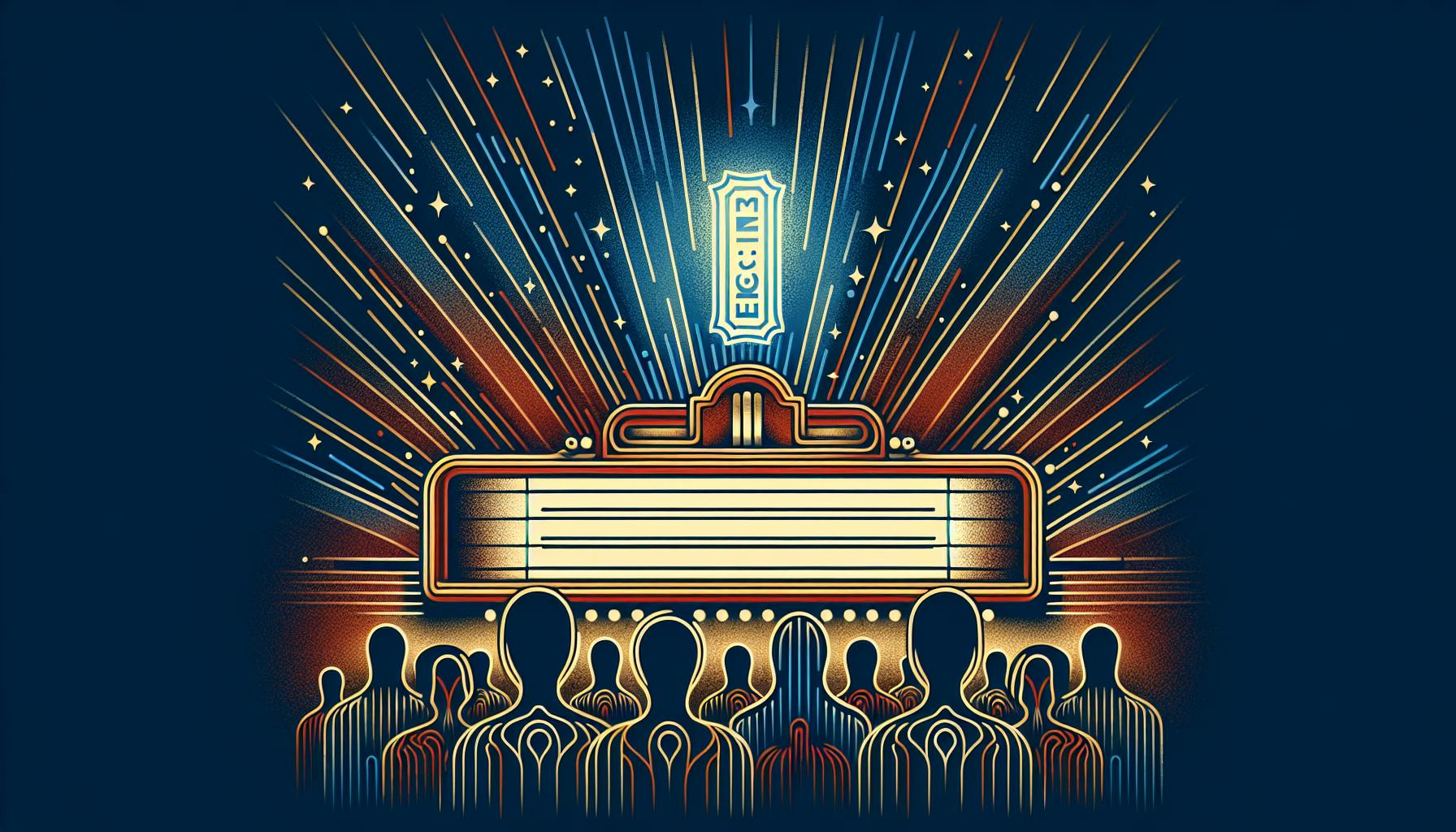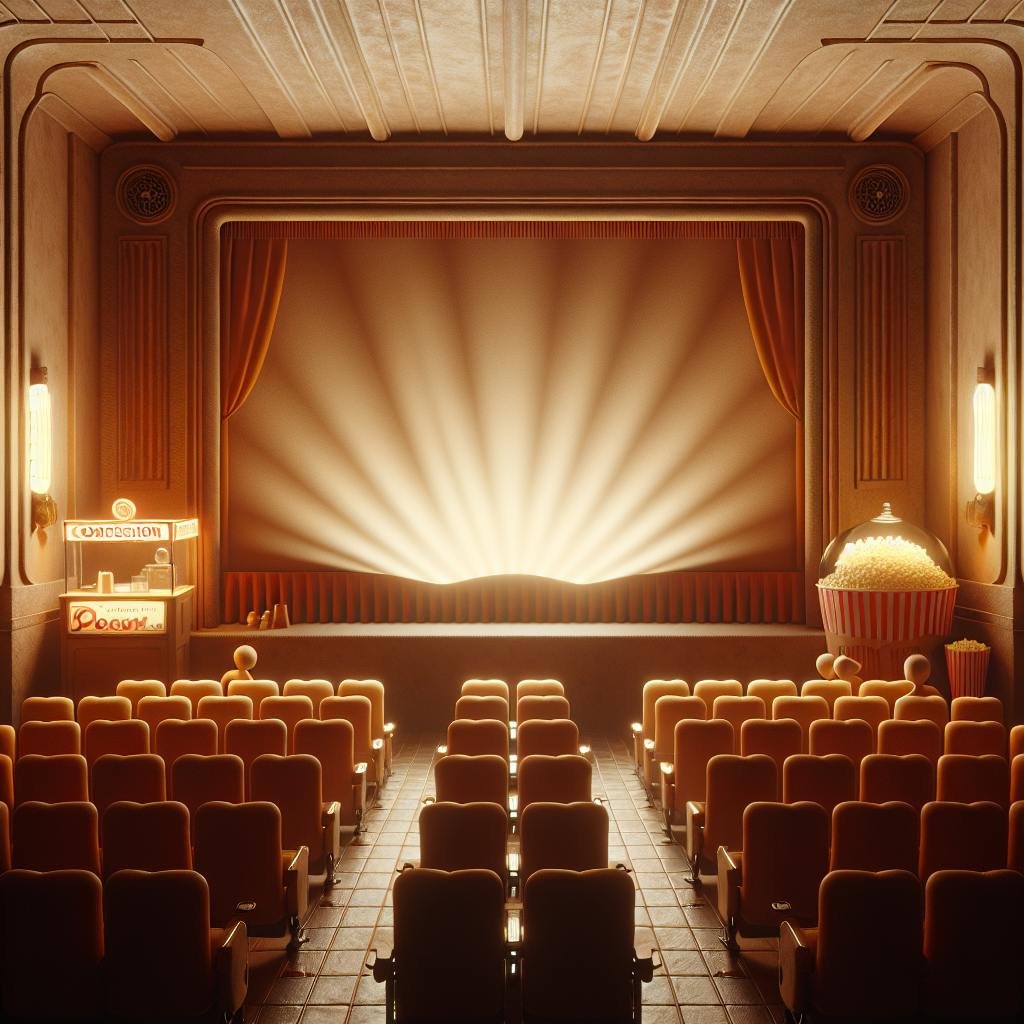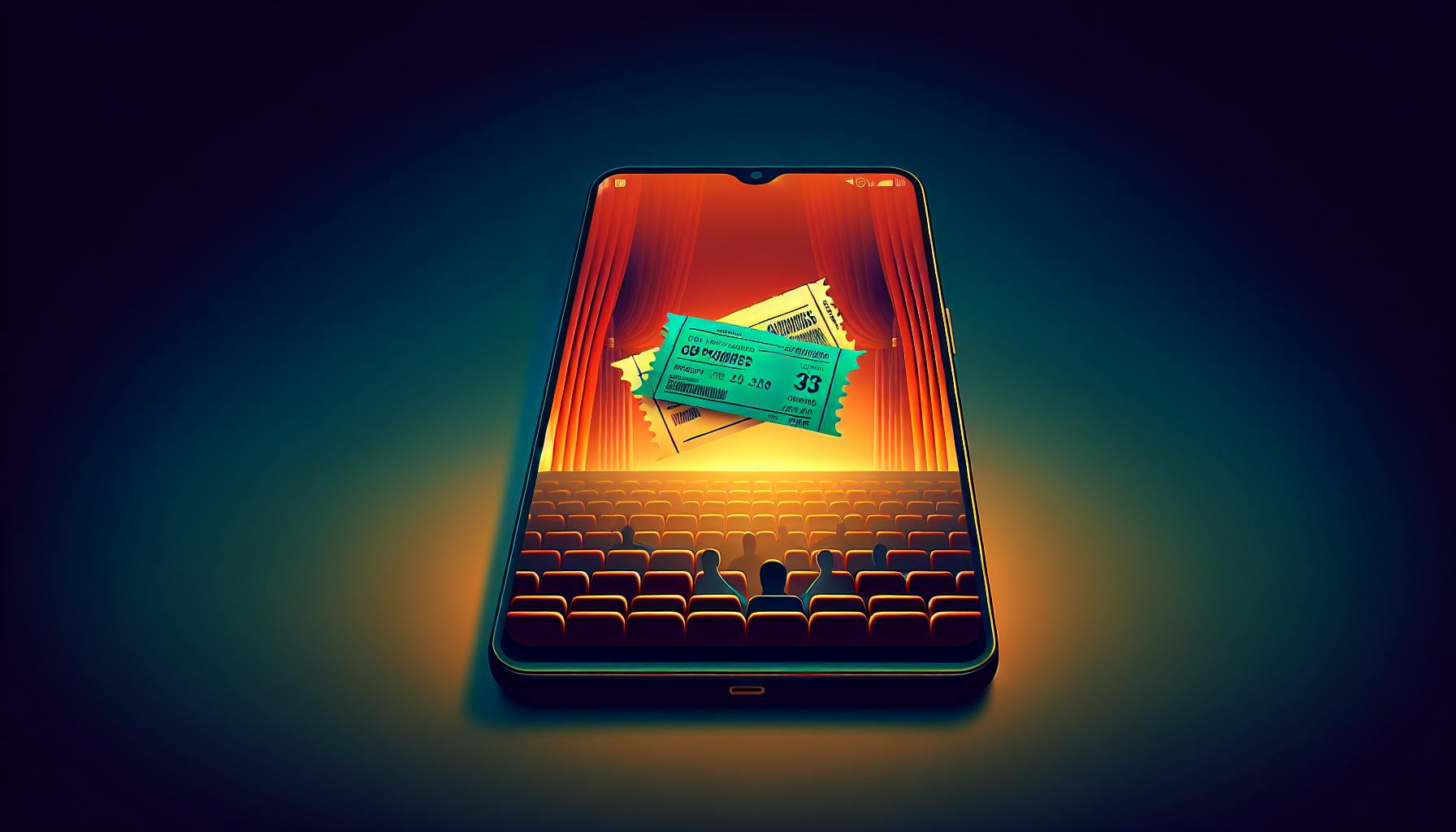Finding the right cinema reservation system can be a daunting task for theater owners and operators.
However, understanding the key capabilities and components that these systems should provide makes it easier to evaluate options and choose the best solution.
In this article, we'll provide an overview of the essential features and functionalities a cinema reservation system requires to efficiently manage movie ticket bookings, sales, and theater operations.
Introduction to Cinema Reservation Systems
A cinema reservation system is essential for movie theaters to sell tickets online, assign seats, manage concessions, and analyze sales. This article provides an overview of the key capabilities a modern system should have.
The Evolution of Movie Ticket Booking Systems
Over the past few decades, cinema reservation systems have transformed how moviegoers purchase tickets and plan their visits:
- Manual ticketing was tedious and time-consuming, involving paper ledgers, cash payments, and long lines.
- The first computerized systems in the 1990s automated sales recording and reporting.
- Online ticketing emerged in the 2000s, enabling remote ticket purchases via theater websites.
- Mobile apps gave customers the ability to buy tickets on their phones from anywhere.
Modern systems like Filmgrail's cinema solutions integrate online, mobile, and in-person sales into one platform with detailed analytics on customer behavior.
Overview of Cinema Reservation System Cost
Implementing a fully-featured cinema reservation system requires an upfront investment and ongoing costs:
- Software - Custom platform or off-the-shelf system ($5,000-$150,000+)
- Hardware - Ticketing kiosks, scanners, printers, servers ($2,000-$20,000)
- Maintenance - Hosting, support, upgrades (10-20% of software cost per year)
Costs vary based on:
- Number of screens/locations
- Custom development needs
- On-premise vs SaaS delivery
Cloud solutions provide affordability through shared infrastructure and resources.
Benefits of a Dedicated Cinema Reservation System App
A custom mobile app for online movie ticketing has many advantages:
- Increased ticket accessibility 24/7 through smartphones
- Improved user experience with an intuitive interface
- Targeted marketing capabilities like push notifications to drive sales
- Valuable customer data and insights from app analytics
Apps can boost ticket sales and modernize a theater's digital presence.
Understanding the Cinema Ticketing System Proposal
When evaluating proposals for a cinema reservation system, key aspects to examine include:
- Features - Online payments, seat selection, concessions, promotions, etc.
- Analytics - Sales reports, customer data, traffic sources, etc.
- Customization - Tailoring to your branding, processes, requirements
- Budget - One-time and recurring costs
- Scalability - Support for adding screens, locations, technologies
- Support - Service level agreements and response times
Getting demos and quotes from multiple vendors is recommended.
Exploring the Movie Ticket Booking System Source Code
For theaters running their own cinema management software, reviewing the source code is critical to:
- Evaluate quality - Code organization, comments, testing
- Enable custom enhancements by internal developers
- Ensure flexibility to add integrations, new features
- Reduce reliance on vendor for changes and upgrades
Well-structured and documented source code saves time and money long-term.
What is cinema reservation system?
A cinema reservation system is an online movie ticketing platform that allows customers to:
- Browse movie showtimes
- View seat availability
- Select and reserve seats
- Purchase tickets
Key capabilities include:
- Real-time seat availability - Customers can see which seats are open and select their preferred spots.
- Integrated payments - Securely process debit/credit cards or other payment methods.
- Mobile optimization - System works on all devices, allowing ticket purchases on-the-go.
- Customizable interface - Theater can brand system with own logos, colors, etc.
Benefits of using an online cinema reservation system:
- Increased ticket sales - More convenient booking process leads to higher sales.
- Improved customer experience - Users can easily see movies and select seats.
- Operational efficiency - Less staff needed for manual bookings.
- Valuable data - Analytics provide insights on sales, traffic, popular shows.
When choosing a cinema reservation system, key aspects to evaluate include:
- User-friendly interface
- Reliable performance
- Secure infrastructure
- Reasonable pricing
- Strong customer support
The right online booking platform can significantly benefit a movie theater's operations and bottom line.
What are the benefits of online movie ticket booking?
Online movie ticket booking offers several key benefits for both moviegoers and cinema owners:
Convenience
One of the most significant advantages of online movie ticket booking is the convenience it offers. Instead of having to rush to the cinema to buy tickets, moviegoers can book their seats from the comfort of their own homes or on the go using their mobile devices. This saves time and effort.
Wider choice
Booking tickets online gives customers access to a wider choice of movies, showtimes, and seats. They can browse what's available across all screens and easily compare options. This makes it easier to find the perfect movie experience.
Reserved seating
Online booking allows customers to select exact seats. This reduces stress and uncertainty on arrival. Customers can book groups of seats together and guarantee they sit with their party.
Special offers
Many online booking platforms provide exclusive online-only discounts and special promotional offers. Subscribing to newsletters can alert customers to deals and encourage advanced booking.
Pre-show engagement
Mobile ticketing apps allow cinemas to engage customers in the lead up to their movie with trailer videos and behind-the-scenes content. This builds excitement and loyalty.
So in summary, online booking drives convenience, choice and offers, while mobile apps provide deeper customer engagement. These benefits can translate into improved customer satisfaction and increased ticket sales for cinemas. Integrating a cinema reservation system is key to unlocking these advantages.
What is an example of a website for booking film tickets online?
Some popular websites for booking movie tickets online include:
-
BookMyShow - One of the most popular cinema ticket booking platforms in India. Offers an easy to use interface to check movie showtimes, read reviews, and securely purchase tickets. Integrates well with mobile apps.
-
Amazon Pay - Allows purchasing movie tickets seamlessly while shopping on Amazon. Provides cashback offers and other deals on ticket bookings. Easy payment using Amazon Pay balance.
-
Paytm - Leading digital payments provider in India also offers movie ticket bookings via web and mobile apps. Supports convenient payment methods like Paytm wallet, UPI, credit cards, and more.
-
TicketNew - Focuses specifically on online movie ticket bookings. Partners with multiple cinema chains across India to provide updated movie schedules and ticket inventory. Offers promotional discounts on regular basis.
Some key benefits of booking movie tickets online include:
- Convenience of purchasing tickets anytime, anywhere via mobile or web
- View updated show timings and seat availability in real-time
- Secure online payment methods like e-wallets, UPI, cards, etc.
- Exclusive discounts and cashback offers
- Avoid long queues at cinema halls
Online ticket booking has become the preferred option for most moviegoers given the ease-of-use and added benefits it provides. Most cinema halls today are integrated with these online ticketing platforms.
sbb-itb-b1b0647
What is the ticket taker at a movie theater called?
Cinema or theatre attendants who collect tickets and control access to theatres and auditoriums are most commonly referred to as ushers or doorpersons. Their key responsibilities include:
- Greeting customers and collecting tickets as patrons enter the cinema
- Tearing ticket stubs and directing customers to the correct auditorium
- Monitoring access to ensure only ticketed customers enter screening areas
- Assisting customers by answering questions and providing direction
- Maintaining organization and cleanliness in lobby areas
- Supporting concession sales by directing customers to the snack bar
While "ticket taker" is an understandable description of one aspect of their duties, "usher" or "doorperson" are more standard industry job titles referring to these customer-facing cinema employees. Their role encompasses a wider range of hospitality, customer service, and crowd control activities beyond just taking tickets.
Key skills for ushers include organization, communication, ability to stand for long periods, basic math for handling cash transactions, and knowledge of films and auditorium locations to properly assist patrons. Ushers help facilitate a smooth, enjoyable, and safe moviegoing experience for all cinema guests.
Key Capabilities of Cinema Reservation Systems
Modern cinema reservation systems have capabilities to drive online ticket sales, enhance the moviegoer experience, and provide actionable analytics. These systems allow cinemas to seamlessly manage bookings, engage visitors, optimize operations, and make data-driven decisions.
Seamless Booking and Ticketing Workflows
An effective cinema reservation system streamlines the booking process for visitors by:
- Allowing selection of movie, showtime, seats, and ticket quantities in one seamless workflow
- Using an intuitive interface to minimize selection errors and cart abandonment
- Supporting creation of member accounts for faster repeat bookings
- Offering multiple payment options (credit card, PayPal, etc) to reduce transaction friction
- Sending confirmation emails and SMS reminders to improve attendance
By smoothing booking friction points, cinemas can drive higher online ticket sales.
Interactive Seat Selection and Cinema Seat Reservation Demos
Interactive seat maps allow visitors to:
- View real-time seat availability and pricing
- Select their desired seats for a more customized experience
- See their selection visually on a map of the auditorium
Offering seat map demos during the booking process also helps visitors familiarize themselves with the interface before purchasing. This improves confidence in seat decisions and reduces errors.
Advanced Booking Forms for User Convenience
Well-designed booking forms enhance convenience by:
- Minimizing required fields to only essential info
- Offering autofill for member accounts
- Using responsive layouts across devices
- Allowing editing before final submission
- Highlighting form errors for easy correction
Simpler forms lead to higher conversion rates during checkout.
Integrated Payment Solutions
Integrating secure payment systems enables cinemas to:
- Support credit cards, mobile wallets, and alternative payment methods
- Reduce manual processing and errors for staff
- Offer flexible partial payments and installment plans
- Minimize fraud through validation checks
- Comply with payment data regulations like PCI
More payment options and robust solutions also provide better visitor experiences.
Real-time Reporting and Analytics
Effective cinema reservation systems provide real-time sales and operational analytics through:
- Interactive data dashboards
- Customizable reports and exports
- Email/SMS alerts on KPIs
- Data integration with other systems
- Seat occupancy and sales tracking
- Campaign performance measurement
With timely data, cinemas gain visibility to make smarter staffing, programming, concession, and promotional decisions.
Essential Components of Cinema Reservation Systems
To meet the needs of modern movie theaters, cinema reservation platforms require certain essential components. These components work together to provide a seamless and efficient reservation system that benefits both theaters and moviegoers.
Comprehensive Central Dashboard
A comprehensive central dashboard is crucial for aggregating key metrics and operations into one easy-to-use interface. Dashboard features should include:
- Real-time sales data and revenue tracking
- Historical performance reports and trends
- Reservation system health monitoring
- Customer analytics and segmentation
- Campaign results and ROI tracking
With all this data in one place, theater managers can better optimize pricing, inventory, staffing, promotions, and more.
POS Integration for Streamlined Sales
Integrating the cinema reservation system with standard POS software unifies the sales process for theater staff. This enables:
- Automatic syncing of ticket sales between systems
- Reduced double-bookings and overselling
- Faster transaction times at the box office
- More up-to-date inventory counts
POS integration is vital for reducing manual errors and creating a seamless purchase experience.
Automated Workflows for Efficiency
Automating repetitive manual tasks is key to optimizing operations. Cinema platforms should provide features like:
- Automated ticket status updates
- Trigger-based emails and SMS
- Dynamic pricing rules
- Automated report generation
This automation frees up staff resources to focus on higher-value initiatives.
Robust Access Control Mechanisms
To ensure smooth audience entry, cinema reservation systems require:
- Secure API integrations with access control hardware
- Customizable access rules and restrictions
- Real-time ticket verification capabilities
- Offline mode support
Robust access controls prevent fraud, maintain order, and provide theater managers more control.
Building and Managing Customer Profiles
Collecting customer data allows theaters to improve marketing and personalize experiences by:
- Tracking purchase history and behaviors
- Segmenting customers for targeted promotions
- Sending tailored recommendations on new releases
- Providing loyalty and referral programs
Managing customer profiles is key for driving repeat ticket sales.
In summary, modern cinema reservation platforms need to provide theater managers valuable business insights, efficient operations, and delightful customer experiences. Core components like dashboards, POS integration, automation, access control, and customer profiling make this possible. With the right reservation system, theaters can significantly boost productivity, revenue, and moviegoer engagement.
Evaluating Cinema Reservation System Vendors
When researching reservation system vendors, it's important to thoroughly assess their capabilities to ensure they can address your theater's key needs and support your operations. Here are some of the main criteria to evaluate:
Assessing Implementation Experience and Track Record
- Industry experience: Look for vendors with extensive experience building cinema reservation systems specifically. They will understand the unique needs better.
- Client examples: Ask for client references and examples of previous cinema implementations. Assess their success and capabilities.
- Implementation timelines: Understand how long implementations typically take and what is required from you. Quick, smooth deployments are ideal.
Customization Options to Fit Unique Theater Needs
- Customizability: The system should adapt to your cinema's specific ticketing, seating, promotions and other needs.
- CRM integration: Important to connect the reservation data with your CRM and loyalty programs.
- Payment gateways: Flexibility to integrate your preferred payment gateways and methods.
Responsive Support for Uninterrupted Operations
- 24/7 support: Issues can happen anytime so prompt around-the-clock assistance is essential.
- Service guarantees: Vendors should commit to uptime and response time service levels.
- Local support: In-region reps can provide hands-on help for quicker resolutions.
Technology Infrastructure and Scalability
- Cloud-based: A cloud platform enables scaling to handle peak demands without infrastructure investments.
- Redundancy: System architecture should eliminate single points of failure that can cause downtime.
- Performance testing: Verify the system can handle your theater's expected traffic volumes.
Data Ownership and Privacy Considerations
- Data security: Vendors should detail their data security, encryption and access control measures.
- Compliance: They should also confirm compliance with regulations like PCI DSS and GDPR.
- Data ownership: You should retain full ownership and rights over your theater's data.
Carefully evaluating vendors against these criteria will help you select a reliable long-term reservation system partner to meet your cinema's goals. The system should address key points like customization, scalability, responsive support and data privacy to provide exceptional capability and value.
Conclusion and Next Steps
Modern cinema reservation systems enable online ticket sales, mobile access, choose-your-seat, concessions management, and data analytics. Assessing vendor capabilities is key to finding the right solution tailored to your cinema's technical and operational requirements.
Key Takeaways on Cinema Reservation System Essentials
An effective cinema reservation system should have the following core capabilities:
- Online and mobile ticket purchasing - Allow customers to conveniently buy tickets on your website and mobile app. Integrates with payment gateways.
- Seat selection - Customers can view the cinema seating map and select their preferred seats when booking online.
- Concessions ordering - Option to add food and drinks to the online booking process.
- Promotions and loyalty programs - Configure special offers, discounts, and loyalty programs to incentivize ticket sales.
- Reporting and analytics - Gain insights into sales, customer behavior, promotions effectiveness with detailed reports and analytics.
Keeping these cinema reservation system essentials in mind will ensure you choose a solution that meets your key requirements.
Creating a Vendor Checklist for Cinema Reservation Systems
When evaluating cinema reservation system vendors, key aspects to consider include:
- Integration capabilities - Seamlessly integrates with your existing cinema tech stack including POS systems, display systems, etc.
- Customization options - Ability to tailor system to your unique workflows and cinema setup.
- Responsive support - Quality technical support during onboarding and post-implementation.
- Data security - Vendor uses industry standard data protection and cybersecurity protocols.
- Pricing model - Clear pricing plans based on number of screens, transactions etc. Avoid complex or hidden costs.
Creating a scorecard and rating vendors on these crucial criteria will simplify the provider comparison and selection process.
Defining Next Steps for Cinema Reservation System Implementation
Once you have selected a vendor, key next steps include:
- Set up implementation team with cross-functional cinema staff roles.
- Define detailed project plan, milestones and timeline in coordination with vendor.
- Conduct testing across different usage scenarios - online ticket sales, mobile app payments, seat selection etc.
- Train staff on updated cinema reservation system workflows.
- Launch marketing campaign to promote new ticketing options to customers.
Closely tracking the rollout and addressing any issues proactively will lead to a smooth system implementation that delivers the desired benefits.


